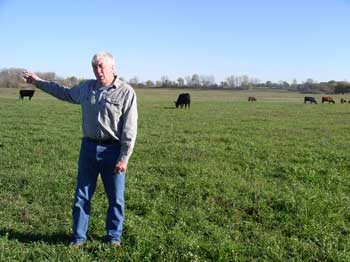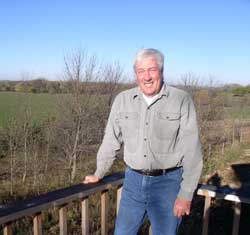 Steve Reinart of Glidden manages 500 acres for grazing. He is the 2008 recipient of the Spencer Award for Sustainable Agriculture.  "'Sustainable,' to me, is simply doing no additional harm, while 'regenerative' improves the soil and ecosystems." Photos courtesy Carroll County NRCS. |
By NATALIE ASKREN, Leopold Center Communications Student Intern
In Steve Reinart's mind, sustainable agriculture has the wrong name. He suggests a different one.
"It should be called regenerative agriculture," he said. "'Sustainable,' to me, is simply doing no additional harm, while 'regenerative' improves the soil and ecosystems."
He lives out what he preaches on his 500-acre operation with seed stock cattle and grass-finished organic beef, making this Glidden grazier fully deserving of the Spencer Award, which he recently received from the Leopold Center. The award was established in 2002 to honor those who have made a substantial contribution to the stability of mainstream family farms in the state.
Reinart's practices differ from most in his field: He relies on grazing and forages for his cattle's nourishment. Not alone in using this method, he regularly gets together with others who also practice holistic management, an approach to grazing that blends land use with natural processes. "We bounce ideas off each other," he said. "If I don't think something is going to meet my holistic goal, I won't use it."
Beyond raising cattle, Reinart is instrumental in the well-being of wildlife in his area and incorporates many shelterbelts, wetlands and ponds into his farming acreage. These improvements helped him qualify in 2005 for Tier III payments for the highest level of conservation practices under the Conservation Security Program.
On his farm, Reinart has some Composite and Black Angus cattle, but his focus and main operation is with Red Angus. "That's the breed I want to settle on eventually," he explained. "They're more heat tolerant and do more of the things I want them to do." He selects for breeding traits such as fertility, longevity and the ability to produce tender and marbled meat.
In the winter, duties are fewer, and much of Reinart's time is spent monitoring his grazing operation called Reinart's Prairie Reds. As a seed stock producer, he currently is preparing bulls to go to Pharo Cattle Company in Cheyenne Wells, Colorado, where they will be forage-tested. Right now, seed stock is one of Reinart's greatest sources of income.
Reinart was born in Iowa and is a 1964 graduate of Carroll Kuemper High School. The fall after his graduation, Reinart participated in a winter-quarter farm operations class at Iowa State University. The following fall, he was drafted into the Army and served in Vietnam.
In 1973, Reinart took over his father's farm. At that time, he mostly operated the conventional way. Around 1975, his uneasiness with conventional farming took hold and he began planting native grasses on his farm, seeing their benefits for wildlife and admiring the way they work as a throwback to how Iowa once was.
"I'm thinking the past forward, taking the best from the past," Reinart said. By 1981, he had transitioned the entire farm to native and cool-season grasses for grazing.
The name of his operation - Reinart's Prairie Reds - came about seven years ago because he needed a name for advertising and an e-mail address. He was certified organic three years ago. It was an easy process for Reinart since he had always avoided insecticides and herbicides.
"I've been living the lifestyle forever, so that's why I could jump in immediately," he said.
Reinart is - and has been - busy proving himself fully deserving of the Spencer Award. He spent 19 years on the Carroll County Conservation Board. He also served 25 years on the Carroll County Soil and Water Conservation District; he was honored the Ruth Wagner Award as the state's outstanding assistant commissioner in 2006. More recently, Reinart has helped the conservation board acquire property and create Reinart's Bend conservation area along the North Raccoon River south of Lanesboro.
Reinart also is on the boards of directors for the Iowa Forage and Grassland Council and M&M Divide RC&Dl, and has worked on efforts to establish a community market in Carroll. He has been a long-time member of Practical Farmers of Iowa, which Reinart touts as a group of people whose mindsets are close to his own.
For the future, he hopes to keep on track with what he is currently doing. He also wants to consider the time when another person will take over his operation and how he can help them to keep it on the path he has set. And for other farmers, Reinart would like to see their agricultural practices become grass-based.
"To me, that's the only true sustainable agriculture that there is," he said.
Speaking of the future of holistic grazing and grazing clusters throughout Iowa, Reinart is hopeful. "There's still a lot of new stuff coming out. That's the beauty of it. We're learning and we're using our minds."
Reinart believes that sustainable agriculture should be an integral part of the way farmers think, that no one should have to receive an award as encouragement to carry out what he and others are practicing.
"We're so blessed to be able to do these things and work with the land," he said.
He also places high importance on ingenuity and individuality. "When everyone else was raising crops in corn and bean country, I was seeding everything to grass. There wasn't a whole lot of this out there," he said. "You pretty well just have to break your own mold.
(Leopold Letter, Winter 2008)